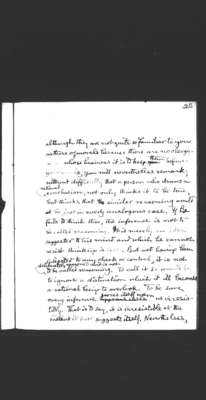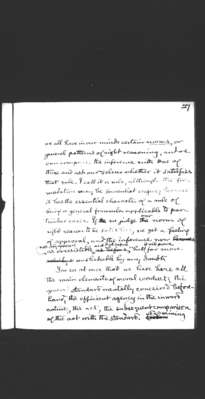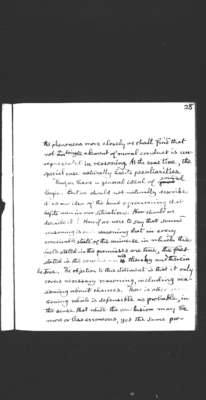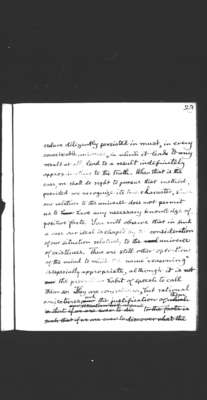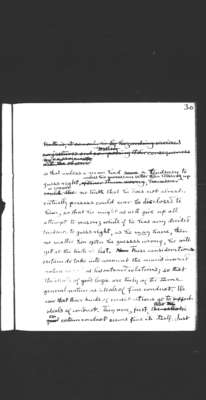Pages
31
26
although they are not quite so familiar to you as these of morals because there are no [?ergemen] whose business it is to keep them before your minds, you will nevertheless remark without difficulty that a person who draws a rational conclusion, not only thinks it to be true, but thinks that similar reasoning would be just in every analogous case. If he fails to think this, the inference is not to be called reasoning. It is merely an idea suggested to his mind and which he cannot resist thinking is true. But not having been subjected to any check or contral, it is not deliberately approved and is not to be called reasoning. To call it so would be to ignore a distinction which it ill becomes a rational being to overlook. To be sure every inference forces itself upon us irresistibly. That is to say, it is irresistible at the instant it just suggests itself. Nevertheless,
32
27
we all have in our minds certain norms, or general patterns of right reasoning, and we can compare the inference with one of those and ask ourselves whether it satisfies that rule. I call it a rule, although the forulation may be somewhat vague; because it has the essential character of a rule of being a general formula applicable to particular cases. If we judge our norm of right reason to be satisfied, we get a feeling of approval, and the inference now not only appears as irresistible as it did before, but it will prove far more unshakable by aby doubt.
You see at once that we have here all the main elements of moral conduct; the general standard mentally concieved beforehand, the efficient agency in the inward nature, the act, the subsequent comparison of the act with the standard. Examining
33
28
the phenomena more closely we shall find that not a single element of moral conduct is unrepresented in reasoning. At the sametime, the special case naturally has it peculiarities.
Thus, we have a general ideal of sound logic. But we should not naturally describe it as our nature of the kind of reasoning that befits men in our situation. How should we describes it? How if we were to say that sound reasoning is such reasoning that in every conceivable state of the universe in which the facts stated in the premisses are true, the fact stated in the conclusion will thereby and therein be true. The objection to this statement is that it only covers necessary reasoning, including reasoning about chances. There is other reasoning which is defensible as probable, in the sense that while the conclusion maybe more or less erroneous, yet the same pro-
34
29
cedure diligently persisted in must, in every concievable universe in which it leads to any result at all, lead to a result indefinitely approximating to the truth. When that is the case, we shall do right to pursue that method, provided we recognise its true character, since our relation to the universe does not permit us to have any necessary knowledge of positive facts. You will observe that in such a case our ideal is shaped by the consideration of our situation relatively to the universe of existences. There are still other operations of the mind to which the name "reasoning" is especially appropriate, although it is not the prevailing habit of speech to call them so. They are conjectures, but rational conjectures; and the justification of them
35
30
is that unless a man had a tendency to guess right, unless his guesses are better than tossing up a copper no truth that he does not already virtually posses could ever be disclosed to him, so that he might as well give up all attempt to reason; while if he has any decided tendency to guess right, as he guesses wrong, he will get at the truth at last. These considerations certain do take at last. These considerations certain do take into account the man's inward nature as well as his outward relations; so that the ideals of good logic are truly of the same general nature as ideals of fine conduct. We saw that three kinds of considerations go to support ideals of conduct. They were, first that certain conduct seems fine it itself. Just
